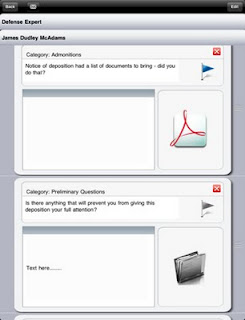When I first reviewed this app for Law Technology News, I pointed out what appeared to be one significant flaw - Deponent utilized the "Public" folder of Dropbox for its file system. The problem with this is that if you're concerned about data security in "the Cloud" (and if you're reading this blog, you probably should be), that is one of the weakest storage locations you could find, second maybe to posting them for convenient and safe download on your Facebook page.
In any event, after a few emails exchanged with the developers, they have informed me that they will have an update available this week, which will install a new "Deponent" folder, located outside the "Public" open folder. They were very gracious and appreciative that it was identified, and thus rectified.
As with many of my other previously published articles, this enhanced version includes recent updates, extra screenshots and commentary. And, in this case, a video!
Prepare for Depositions With the iPad Deponent App
Reprinted with permission from the April 21, 2011 issue of Law Technology News. ©2011 ALM Media Properties, LLC.
Josh Gilliland, Majority Opinion president and author of the Bow Tie Law blog, formed the idea for the Deponent App after he heard a state court judge claim that 93 percent of litigation in the U.S. is in state court. "I wanted to build something that could help the majority of litigators in the United States," says Gilliland. After talking with a friend who wanted an iPad, but who had no idea of how to use it in his law practice, Gilliland started thinking "what would make the most sense to a litigator?" Gilliland's thoughts developed into the Deponent, which is designed to ask more questions than it answers. And in preparing for a deposition, that's a good thing.
Is every question that could ever be asked in a deposition included in the app? Obviously not -- but most of the basics are in there, ready to use or modify as needed. You can also create your own questions and categorize them by issue or topic. And, by linking the corresponding deposition exhibit to the question, you're not likely to forget the connection between the two. In some instances, you may be able show the exhibits right from your iPad, but unless all parties and counsel are technically "enabled," you may still want to drag along a few boxes and binders.
While you can link one exhibit to a question, I would like to see this feature expanded to add multiple exhibits to a question. For example, you might ask an expert witness about their qualifications and include their curriculum vitae as well as another relevant document, such as a biography or an online profile. Another question might ask a witness to review two different versions of a document.
Exhibits such as Microsoft Office files, images, PDF files, or TIFF's can be loaded into the Deponent through iTunes and Dropbox, although the developers suggest PDF as the ideal and preferred format. When you select the Exhibits icon for the first time, you will have the option to link your Dropbox account to the app. You should note that even after linking Dropbox, any files you choose to import into the app are copied into a program folder on the iPad. So once you have an exhibit included in the app, it will not be removed if you remove it from Dropbox; the same applies to files imported via iTunes.
One issue I found: The Deponent will only allow you to access files stored in your Dropbox Public folder. Although I am a Dropbox addict, the Public folder is one of the least secure places you can find to store anything in the cloud. Although it might be relatively unlikely that someone would discover the links to any documents in your Public folder, it is certainly possible -- and there is absolutely no security. For instance, I have stored my own biography in the Public folder of my Dropbox account -- there's no password protection to keep anyone from accessing it. As long as my file remains in the Public folder, the link remains active.
Although Majority Opinion developers are working on a fix for Drop Box insecurity, I would strongly caution against using this feature unless you have no concern that uninvited guests might access your exhibits. If you are concerned, then load your files from iTunes. If you absolutely must use the Dropbox import, you can temporarily copy the exhibits into the Public folder, and then delete them after you've imported them into the Deponent. At least the risk wouldn't be "live" for long.
The Deponent also allows you to e-mail a copy of your notes taken during the deposition to yourself or others. This might include your comments and observations about the responses to the deposition questions or exhibits. This feature can replace or supplement your trusty legal pad. To help you get quickly up to speed, a series of training tutorial videos are available online. This set of short videos covers the basics quite well, although the Deponent App is certainly not too difficult to figure out on your own. Of those featured, here is perhaps the most helpful of the bunch:
In summary, like many other iPad apps for lawyers that I have reviewed, the single-purpose Deponent App does what it was designed to do just fine.
The interface is clean and simple, and there is plenty of flexibility to customize the questions and link them to exhibits to help you prepare for a deposition.
:::: PRODUCT INFORMATION ::::
The Deponent App, $9.99, from Majority Opinion
213-798-6608 Los Angeles
415-291-9900 San Francisco












